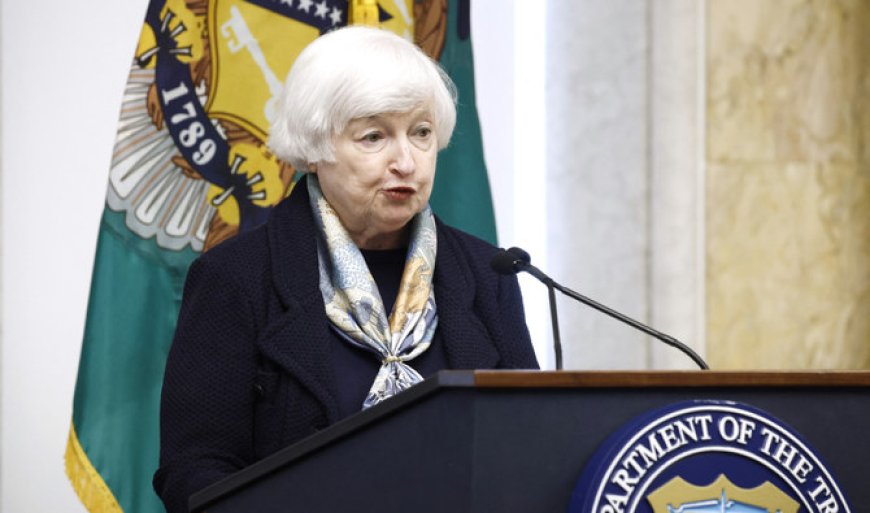US Expands Sanctions on Russia, Targeting Chinese Semiconductor Sales and Financial Institutions
Targeting Chinese companies providing semiconductors to Moscow, the United States has extended its sanctions to reflect a major change in the continuous sanctions strategy meant to undermine Russia's military capability and war economy in a marked intensification of their economic pressure on Russia. Particularly as the war in Ukraine enters its third year, this action and secondary sanctions threats directed at international financial institutions doing business with Russian businesses clearly indicate that the United States is stepping up its attempts to undermine Russia's war machine.

Targeting Chinese companies providing semiconductors to Moscow, the United States has extended its sanctions to reflect a major change in the continuous sanctions strategy meant to undermine Russia's military capability and war economy in a marked intensification of their economic pressure on Russia. Particularly as the war in Ukraine enters its third year, this action and secondary sanctions threats directed at international financial institutions doing business with Russian businesses clearly indicate that the United States is stepping up its attempts to undermine Russia's war machine.
Declared by the U.S. Treasury on June 13, 2024, the new sanctions package increases the stakes for nations and businesses engaged in trade with Russia. The United States is effectively telling international financial institutions that ongoing interaction with Russia could cause access to the U.S. financial system to be lost by threatening secondary penalties. This strategy seeks to isolate Russia even further by cutting off access to foreign markets and so making it more challenging for Moscow to keep running military activities.
Targeting Chinese-based companies that are providing semiconductors to Russia is one of the most powerful aspects of this most recent round of sanctions U.S. officials disclosed that the Commerce Department is focusing on Hong Kong shell businesses who have been distributing high-priority chips to Russian military operations. From drones to missiles, these chips have been discovered in a variety of Russian military equipment; Ukrainian officials have confirmed that U.S.-made technologies is present in Russian military systems taken from the front lines.
The choice to punish this almost $100 million worth of semiconductor supplies emphasizes the critical part technology plays in contemporary warfare. Long worried about Russia's reliance on Western technology, especially in the areas of electronics and defense, U.S. officials have seen that this gives the nation a means of escaping sanctions. Targeting outside vendors—especially in China and Hong Kong—the United States is closing the noose around Russia's capacity to sustain military operations and supply lines.
Moreover, the U.S. is extending its sanctions reach to Russian financial infrastructure; Moscow Exchange (MOEX) and affiliated companies are sanctioned for helping sanctions evasion. MOEX has been instrumental in allowing Russian institutions to hide their names and go above financial constraints. By supporting this infrastructure, the United States hopes to compel more openness on cross-border trade, therefore making it more difficult for Russia to conceal its financial operations and keep financing its war efforts.
Although many experts still doubt that sanctions by themselves can alter Russian President Vladimir Putin's thinking, they believe that over time these policies will greatly restrict Russia's military economy. Janet Yellen, the Treasury Secretary, underlined that the most recent moves were meant to target Russia's remaining channels of procurement for vital goods and equipment, especially those obtained from outside sources. These actions complement a larger plan to methodically undermine Russia's economy, therefore challenging the Kremlin's ability to maintain military aggression in Ukraine.
Former White House senior director for international economics Peter Harrell said the penalties represent a "paradigm shift," pointing out they indicate a move toward imposing a worldwide financial embargo on Russia. The United States is indicating a more all-encompassing and comprehensive approach to isolate Russia economically by raising the number of people and organizations capable of triggering secondary penalties to 4,500 from approximately 1,200. This aims to not only stop Russia from discovering other financial paths to evade sanctions but also disturb its war efforts.
As President Joe Biden gets ready to travel to a summit in southern Italy with Group of Seven (G7) democratic leaders, where support for Ukraine and additional efforts to disarm the Russian war machine will be top on the agenda, the latest penalties also come as. Now in its third year, the G7 leaders are anticipated to keep advocating more thorough sanctions and to increase their group determination in isolating Russia politically and economically.
Ultimately, the U.S. extension of sanctions against Russia marks a significant turning point in the continuous endeavor to undermine the Russian military economy and restrict its capacity to fight war on Ukraine. Targeting semiconductor supply, foreign financial institutions, and Russia's financial infrastructure helps the United States to more aggressively cut off Russia's access to vital resources. Although the entire effects of these sanctions are yet unknown, they clearly indicate a change in U.S. policy toward approaching a worldwide financial embargo on Russia, effectively isolating the nation from international trade and finance. These sanctions will be very important in determining the economic battlefield as the war goes on and might finally help Russia's capacity to keep running military operations in Ukraine to be undermined to diminish.













































